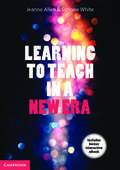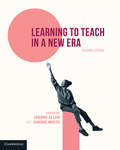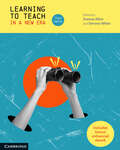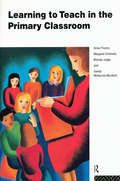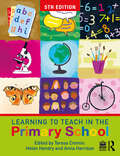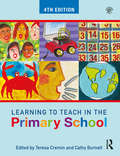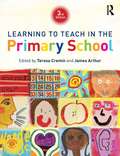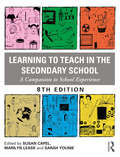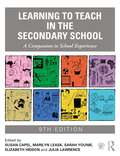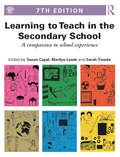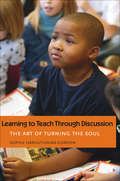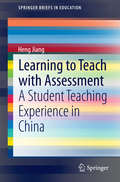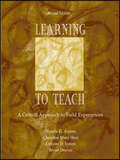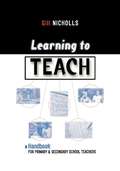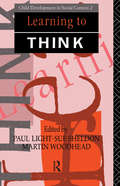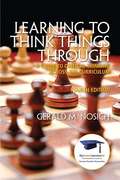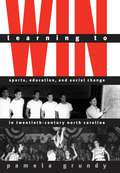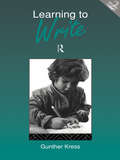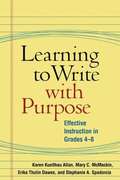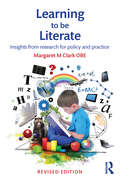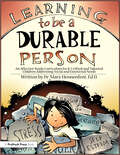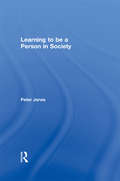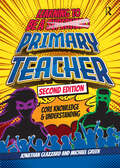- Table View
- List View
Learning to Teach in a New Era
by Simone White Jeanne AllenClosely aligned with the Australian Professional Standards for Teachers (APST) and the Australian Curriculum, this book is an invaluable resource for early childhood, primary and secondary preservice teachers that can be carried through their entire degree and into the workplace.
Learning to Teach in a New Era
by Simone White Jeanne AllenEntering the teaching profession in the twenty-first century comes with many challenges and even more opportunities to meet the learning needs of Australian students. Learning to Teach in a New Era provides a fundamental introduction to educational practice for early childhood, primary and secondary preservice teachers. Closely aligned with the Australian Curriculum and the Australian Professional Standards for Teachers, this text builds on foundational knowledge and provides guidance on professional development throughout your career in education. Organised in three sections – professional knowledge, professional practice and professional engagement – and thoroughly updated, this text introduces educational policy and the legal dimensions of education; encourages the development of practical skills in pedagogy, planning, assessment, digital technologies and classroom management; and supports effective communication and ethical practice. This edition features a new chapter exploring Aboriginal and Torres Strait Islander ways of knowing, being and doing, enabling teachers to create respectful and culturally responsive classrooms.
Learning to Teach in a New Era
by Simone White Jeanne AllenLearning to Teach in a New Era provides a positive, future-oriented approach to preparing preservice and beginning teachers to teach and to embrace the rewarding aspects of working in the educational sphere. Learning to Teach in a New Era supports learners to understand and address the mandatory accreditation requirements of teaching in Australia. Emerging teachers are encouraged to develop and reflect on their philosophies of teaching, supported by features including scenarios, teacher reflections, critical thinking questions, research activities and review questions. This edition features a significant new chapter exploring the importance of trauma-informed practice, and incorporates expanded discussions about diversity and inclusion. Written by a team of authors with diverse expertise in the field of education, Learning to Teach in a New Era provides an essential introduction to educational practice.
Learning to Teach in the Primary Classroom
by Brenda Judge Anne Proctor Margaret Entwistle Sandy McKenzie-MurdochThis text is specially designed to support student teachers in the school based element of their course. It provides accessible guidance, backed by numerous classroom examples, on the essential knowledge and skills needed to teach effectively. The chapters cover:* Classroom organisation* Planning for children's learning* Teaching strategies* Assessment, recording and reporting* Self-appraisalEach section contains information in concise and practical form. For students wishing to explore subjects in more depth, supplementary material at the end of the chapters includes analysis of curriculum and policy documents, case studies, suggestions for further reading and activities to try out in the classroom. Throughout, novice teachers are encouraged to think about how the basic skills fit together in their professional development and determine the sort of teacher that they will eventually be.
Learning to Teach in the Primary School
by Peter HudsonEducation is in a constant state of change and development. Learning to Teach in the Primary School provides a pathway into Australian education for preservice primary teachers. This practical and engaging text includes strong links to the Australian Curriculum and frames teaching around understanding primary students, how they learn, and their contexts. The book includes numerous valuable teaching resources such as: • applied learning boxes, discussion questions, and research topics • specific information related to the teaching of literacy, mathematics and science • practical guidance across a range of key learning areas, exploring the breadth and depth of teaching and learning opportunities for primary students. Drawing on the wide-ranging expertise of each contributor, this text provides techniques to engage primary students in high-quality education. The concluding chapters of the book focus on professional growth, making this a valuable resource throughout preservice teachers' tertiary coursework and into their professional careers.
Learning to Teach in the Primary School (Learning to Teach in the Primary School Series)
by Teresa Cremin Helen Hendry Anna HarrisonHow do you become an effective primary school teacher? What do you need to be able to do? What do you need to know?Flexible, effective and creative primary school teachers require subject knowledge, an understanding of their pupils and how they learn, a range of strategies for managing behaviour and organising environments for learning, and the ability to respond to dynamic classroom situations.The fifth edition of this bestselling textbook has been fully updated with the latest research and initiatives in the field, as well as the most recent curriculum and policy changes across the UK. It features two new co-editors and 13 new chapters and enhanced accessibility throughout. New or completely rewritten chapters have been included on: Reading curriculum Writing curriculum Maths curriculum Science curriculum Arts-enriched curriculum Humanities curriculum Adaptive teaching Education and wellbeing Education for sustainability Applying for jobs and preparing to be an ECT A selection of extra tasks have been woven throughout, with an emphasis on innovative, reflective practice, and new ‘vivid examples’ bring each chapter’s argument to life in a classroom context.Providing a comprehensive but accessible introduction to teaching and learning in the primary school, covering everything a trainee needs to know in order to gain QTS, this accessible and engaging textbook is essential reading for all students training to be primary school teachers.This textbook is supported by a free companion website with additional resources for instructors and students and an accompanying series of books on Teaching Creatively across the curriculum.
Learning to Teach in the Primary School (Learning to Teach in the Primary School Series)
by Teresa Cremin Cathy BurnettHow do you become an effective primary school teacher? What do you need to be able to do? What do you need to know? Flexible, effective and creative primary school teachers require subject knowledge, an understanding of their pupils and how they learn, a range of strategies for managing behaviour and organising environments for learning, and the ability to respond to dynamic classroom situations. The fourth edition of this bestselling textbook has been fully updated with the latest research and initiatives in the field, as well as the most recent changes to the National Curriculum across the UK. Twenty four new authors have contributed, sharing their expertise and experience as practitioners. Ten brand new units have been included on: Becoming a professional in the current context Building inclusive communities of engaged learners Understanding schools’ aims and enacting your own Teaching for social justice Reading Grammar and punctuation Mastery in mathematics The value of outdoor learning Primary education in a digital age A selection of extra tasks have been woven throughout, with an emphasis on innovative, reflective practice, and new ‘vivid examples’ bring each chapter’s argument to life in a classroom context. In addition, each chapter contains M-level tasks and further reading to assist with research assignments, and differences in the National Curriculum and policy in Scotland, Wales and Northern Ireland are highlighted. Providing a comprehensive but accessible introduction to teaching and learning in the primary school, covering everything a trainee needs to know in order to gain QTS, this accessible and engaging textbook is essential reading for all students training to be primary school teachers. This textbook is supported by a free companion website with additional resources for instructors and students (www.routledge.com/cw/Cremin) and an accompanying series of books on Teaching Creatively across the curriculum.
Learning to Teach in the Primary School (Learning to Teach in the Primary School Series)
by Teresa Cremin James ArthurFlexible, effective and creative primary school teachers require subject knowledge, an understanding of their pupils and how they learn, a range of strategies for managing behaviour and organising environments for learning, and the ability to respond to dynamic classroom situations. This third edition of Learning to Teach in the Primary School is fully updated with reference to the new National Curriculum, and has been revised to provide even more practical advice and guidance to trainee primary teachers. Twenty-two new authors have been involved and connections are now made to Northern Irish, Welsh and Scottish policies. In addition, five new units have been included on: making the most of your placement play and exploration in learning behaviour management special educational needs phonics. With Masters-level reflective tasks and suggestions for research-based further reading, the book provides valuable support to trainee teachers engaged in learning through school-based experience and through reading, discussion and reflections as part of a teacher education course. It provides an accessible and engaging introduction to knowledge about teaching and learning that every student teacher needs to acquire in order to gain qualified teacher status (QTS). This comprehensive textbook is essential reading for all students training to be primary school teachers, including those on undergraduate teacher training courses (BEd, BA with QTS, BSc with QTS), postgraduate teacher training courses (PGCE, SCITT) and employment-based teacher training courses (Schools Direct, Teach First), plus those studying Education Studies. This textbook is supported by a free companion website with additional resources for instructors and students and can be accessed at www.routledge.com/cw/Cremin.
Learning to Teach in the Secondary School
by Noelene L Weatherby-FellLearning to Teach in the Secondary School presents secondary teaching theory and practice within a contemporary, holistic framework that empowers pre-service teachers to become effective and reflective practitioners. This practical and engaging book includes many valuable teaching resources such as: • practical examples and case studies based on personal teaching experiences in school systems, to encourage effective education intervention for the empowerment of secondary students • questions and research topics to emphasise the importance of collaboration and to highlight opportunities for discussion within each chapter • explicit instructional and behavioural strategies and guidance for pre-service teachers to implement in their classrooms. Drawing on the wide-ranging expertise of its contributors, Learning to Teach in the Secondary School provides teachers with the specialist skills necessary to make a difference to the lives and outcomes of young people at a time of significant physical, social, emotional and cognitive development.
Learning to Teach in the Secondary School: A Companion to School Experience (Learning to Teach Subjects in the Secondary School Series)
by Marilyn Leask Sarah Younie Susan CapelFor all undergraduate, postgraduate and school-based routes to qualified teacher status, Learning to Teach in the Secondary School is an essential introduction to the key skills and knowledge needed to become a secondary teacher. Underpinned by evidence-informed practice and focussing on what you need to know to thrive in the classroom, the eighth edition is fully updated in light of changes in the field, covers new topics and provides additional guidance on topics such as developing your resilience, using digital technologies, closing the achievement gap and using data to inform your teaching and pupil learning. The text includes a wealth of examples and tasks to demonstrate how to successfully apply theory to practice and how to critically reflect on and analyse your practice to maximise pupil learning. The wide range of pedagogical features supports both school- and university-based work up to Masters level. Written by experts in the field, the 37 concise units create unit-by-unit coverage that can be dipped into, offering guidance on all aspects of learning to teach including: Managing your workload Lesson planning Curriculum Motivating pupils Promoting behaviour for learning Assessment, marking and feedback Special educational needs and disabilities (SEND) Applying for jobs, developing as a professional and networking Learning to Teach in the Secondary School provides practical help and guidance for many of the situations and potential challenges you are faced with in school. The text is extended by a companion website that includes additional information as well as specific units covering England, Northern Ireland, Scotland and Wales. Supported by the subject-specific titles in the Learning to Teach Subjects in the Secondary School Series, it is an essential purchase for every aspiring secondary school teacher.
Learning to Teach in the Secondary School: A Companion to School Experience (Learning to Teach Subjects in the Secondary School Series)
by Susan CapelThe market leading text for beginning teachers on all undergraduate, postgraduate and school-based routes to QTS, it provides an essential introduction to the key skills and knowledge needed to become a successful teacher. Offering advice on all aspects of teaching and learning, this ninth edition has been thoroughly updated to reflect changes in the field and covers key new topics, including the science of learning, online pedagogies and working with your mentor. There are also expanded units on diversity and inclusion and teacher wellbeing. The text includes a wealth of examples and tasks to support you in successfully applying theory to practice, and in critically reflecting on and analysing your practice to maximise pupil learning. The wide range of pedagogical features supports both school- and university-based work up to Masters level. Written by experts in the field, the 41 concise units are underpinned by evidence-informed practice and focus on what you need to know to thrive in the classroom, including: lesson planning; curriculum; managing behaviour; online lessons and digital resources; effective communication with pupils; how pupils learn; assessment, marking and feedback; diversity and inclusion; special educational needs and disabilities (SEND); managing stress, workload and time; applying for jobs, developing as a professional and networking. The book is extended and enhanced through a companion website that includes downloadable chapter-specific resources, links to useful websites and interactive elements. The website also offers a range of multimedia materials including animated explainer videos and author-created videos. It also provides specific web-only units covering England, Northern Ireland, Scotland and Wales. Supported by the subject-specific titles in the Learning to Teach Subjects in the Secondary School and A Practical Guide to Teaching Subjects in the Secondary School Series, it is an essential purchase for every aspiring secondary school teacher.
Learning to Teach in the Secondary School: A companion to school experience
by Marilyn Leask Sarah Younie Susan CapelLearning to teach involves hard work and careful preparation. To become an effective teacher requires pedagogical and subject knowledge, an understanding of your pupils and how they learn, and the confidence to respond to dynamic classroom situations.Learning to Teach in the Secondary School is the market leading text for all undergraduate, postgraduate and school-based routes to qualified teacher status. It offers an in-depth and practical introduction to the knowledge, skills and understanding needed to become a confident and effective teacher. With a focus on evidence-based practice, the book includes a wealth of examples to demonstrate how to successfully apply theory to practice, and how to critically analyse your practice to maximise pupil learning.This 7th edition is fully updated in light of the latest initiatives, evidence and research in the field, offering comprehensive coverage, unit by unit, of the key concepts and skills addressed on initial teacher education courses in preparation for work in schools. The wide range of pedagogical features support both university based work - including that up to Masters Level - and school-based initial teacher education, and are designed to help you develop those qualities that lead to good practice and a successful future in education. Written by expert practitioners, thirty-six essential units include: •??????? adopting a positive approach to managing behaviour to support learning •??????? ways pupils learn •??????? planning lessons, units of work and schemes of work •??????? motivating pupils •??????? assessment •??????? inclusion and special educational needs •??????? using ICT and digital technologies •??????? pupil grouping, progression and differentiation •??????? managing time, workload and stress •??????? getting your first teaching post. Learning to Teach in the Secondary School provides practical help and guidance for many of the situations and potential challenges you are faced with in school. Supported by the Learning to Teach Subjects in the Secondary School Series, it is an essential purchase for every aspiring secondary school teacher.
Learning to Teach through Discussion: The Art of Turning the Soul
by Sophie Haroutunian-GordonThis sequel to Sophie Haroutunian-Gordon's acclaimed Turning the Soul: Teaching Through Conversation in the High School presents a case study of two people learning to teach. It shows them engaging two groups of fourth grade students in discussion about the meaning of texts--what the author calls "interpretive discussion. The two groups differ with respect to race, geographical location, and affluence. As the novice teachers learn to clarify their own questions about meaning, they become better listeners and leaders of the discussions. Eventually, they mix the students from the two classrooms, and the reader watches them converse about a text as the barriers of race and class seem to break down. In addition to the detailed analysis of the case study,Learning to Teach Through Discussion: The Art of Turning the Soulpresents philosophical, literary, and psychological foundations of interpretive discussion and describes its three phases: preparation, leading, and reflection. A tightly argued work, the book will help readers learn to engage students of all ages in text interpretation.
Learning to Teach with Assessment
by Heng JiangThis ethnography asks the question, what does learning to teach mean to student teachers and to those around them in an exam-driven rural school in China? The author writes of the process of using the assessment as a tool for teacher learning, understanding disadvantaged students in the community of practice, and of beginning teachers seeking their identities. She offers a perspective of learning to teach with assessment instead of for assessment, and examines how it shapes the learn-to-teach experiences.
Learning to Teach: A Critical Approach to Field Experiences
by Natalie G. Adams Christine Mary Shea Delores D. Liston Bryan DeeverThis text is designed to assist preservice and inservice teachers in creating a critical and reflective dialogue with themselves, their assigned classroom cultures, and the larger school environment. It engages readers in a series of classroom and school-based activities, observations, and exercises that can be used in any teacher education course with a field component. Different from other field experience guides, this text aims to disrupt traditional conceptions of teacher education and field experiences--by emphasizing the problematic nature and dynamics of public schooling, and encouraging readers to seek a greater awareness of their own attitudes toward and connections with these educational processes.Learning to Teach: A Critical Approach to the Field Experience, Second Edition:*dramatically reconceptualizes the field experience by asking preservice and inservice teachers to be active and critical researchers of classroom practices and processes;*provides a coherent framework for analyzing both structural and cultural aspects of schooling;*provides specific exercises to help preservice and inservice teachers evaluate and understand the intersections of race, class, gender, and culture in "real life" school settings; and*grounds the observations of everyday school life within critical, feminist, and poststructuralist discourses.New in the Second Edition: A new section,"No Child Left Untested," has been added to help preservice teachers explore the implications of a very changed post-September 11world in which xenophobia, violence, patriotism, citizenship, and democracy have taken on new meanings. The introduction to the book as a whole, the section introductions, the retained activities in existing sections, and the references have been throughly updated.
Learning to Teach: A Handbook for Primary and Secondary School Teachers
by Gill NichollsWritten in accordance with the Teacher Training Association and DfEE guidelines, this text is intended to become a course reference. The author examines all modules which need to be studied in teacher training programmes and takes account of the Labour government's plans for teacher education.
Learning to Think (Child Development in Social Context)
by Martin Woodhead Paul Light Sue SheldonFirst published in 1991. Routledge is an imprint of Taylor & Francis, an informa company.
Learning to Think Things Through: A Guide to Critical thinking across the Curriculum
by Gerald M. NosichLearning to Think Things Through presents a combination of instruction and exercises that shows the reader how to become active learners rather than passive recipients of information, use critical thinking to more fully appreciate the power of the discipline they are studying, to see its connections to other fields and to their day-to-day lives, and to maintain an overview of the field so they can see the parts in terms of the whole.
Learning to Win
by Pamela GrundyOver the past century, high school and college athletics have grown into one of America's most beloved--and most controversial--institutions, inspiring great loyalty while sparking fierce disputes.In this richly detailed book, Pamela Grundy examines the many meanings that school sports took on in North Carolina, linking athletic programs at state universities, public high schools, women's colleges, and African American educational institutions to social and economic shifts that include the expansion of industry, the advent of woman suffrage, and the rise and fall of Jim Crow. Drawing heavily on oral history interviews, Grundy charts the many pleasures of athletics, from the simple joy of backyard basketball to the exhilaration of a state championship run. She also explores conflicts provoked by sports within the state--clashes over the growth of college athletics, the propriety of women's competition, and the connection between sports and racial integration, for example. Within this chronicle, familiar athletic narratives take on new meanings, moving beyond timeless stories of courage, fortitude, or failure to illuminate questions about race, manhood and womanhood, the purpose of education, the meaning of competition, and the structure of American society.
Learning to Write
by Gunther KressFirst published in 1982, this influential and classic text poses two questions: what is it that a child learns when he or she learns to write? What can we learn about children, society and ourselves, by looking at this process? The book is based on a close analysis of a series of written texts by primary school children and is written for student teachers with little or no knowledge of linguistics. In this new edition, Gunther Kress has made extensive revisions in the light of recent developments in linguistics and in education. The theoretical focus is now a social semiotic one, which allows a fundamental rethinking of issues such as 'preliteracy' and broad social and cultural questions around the making of texts.
Learning to Write with Purpose
by Stephanie A. Spadorcia Erika Thulin Dawes Mary C. Mcmackin Karen Kuelthau AllanCommunicating ideas and information is what makes writing meaningful-yet many upper elementary and middle school students write in a vacuum, without considering the aims of their writing or the needs of their readers. This highly informative, teacher-friendly book presents a fresh perspective on writing instruction along with practical methods for the classroom. Teachers learn ways to promote the skills and strategies needed to write and revise effectively in a range of genres: personal narratives, fiction, and poetry; persuasive, explanatory, and "how-to" writing; and writing for high-stakes tests. Special features include vivid classroom vignettes, examples of student work, evaluation guidelines, and suggested "mentor texts" that model different genres.
Learning to be Literate: Insights from research for policy and practice
by Margaret M ClarkWinner of the prestigious UK Literacy Association Academic Book Award for 2015 in its original edition, this fully revised edition of Learning to be Literate uniquely analyses research into literacy from the 1960s through to 2015 with some surprising conclusions. Margaret Clark explores the argument that young children growing up in a literate environment are forming hypotheses about the print around them, including environmental print, television, computer games and mobile phones. In a class where no child can yet read there is a wide range of understanding with regards to concepts of print and the critical features of written language. While to any literate adult, the relationship between spoken and written language may be obvious, young children have to be helped to discover it. This persuasive argument demonstrates the value of research in order to make informed policy decisions about children’s literacy development. Accessible and succinct, Professor Clark’s writing brings into sharp focus the processes involved in becoming literate. The effect on practice of many recent government policies she claims run counter to these insights. The key five thematic sections are backed up with case studies throughout and include: Insights from Literacy Research: 1960s to 1980s Young Literacy Learners: how we can help them Curriculum Developments and Literacy Policies, 1988 to 1997: a comparison between England and Scotland Synthetic Phonics and Literacy Learning: government policy in England 2006 to 2015 Interpretations of Literacy in the Twenty-first Century
Learning to be a Durable Person: Social and Emotional Activities and Teacher Guide (Grades K-5)
by Mary HennenfentWhat is a durable person? What traits do successful people exhibit? What is a perfectionist? These questions and many others are explored in this practical guide to helping gifted students navigate social and emotional issues in their lives. This curriculum is designed to help gifted children explore their own giftedness, expand social skills, cultivate leadership skills, and develop strategies for combatting stress, anger, and perfectionism. Gifted children must be taught to be durable so they can continue to be responsible and productive citizens. Topics covered in Learning to be a Durable Person include:Being gifted means different things to different people,Successful people exhibit the traits of creativity, goal setting, intelligence, courage and kindness,A person who chooses a career based on his or her intelligences may be more productive and satisfied in his or her career,Understanding why people tease others may allow you to choose how to deal with teasing, andNo one is perfect.Grades K-5
Learning to be a Person in Society
by Peter JarvisLearning is a lifelong process and we are the result of our own learning. But how exactly do we learn to be a person through living? In this book, Peter Jarvis draws together all the aspects of becoming a person into the framework of learning. Considering the ongoing, "nature versus nurture" debate over how we become people, Jarvis’s study of nurture - what learning is primarily about – builds on a detailed recognition of our genetic inheritance and evolutionary reality. It demonstrates the ways in which we become social human beings: internalising, accommodating and rejecting the culture to which we are exposed (both primarily and through electronic mediation) while growing and developing as human beings and people. As learning theory moves away from traditional, single-discipline approaches it is possible to place the person at the centre of all thinking about learning, by emphasising a multi-disciplinary approach. This wide-ranging study draws on established research from a number of disciplines into the complexities that make us who we are. It will appeal to a wide variety of audiences: those involved in all fields of education, the study of learning and development, human resource development, psychology, theology and the caring professions.
Learning to be a Primary Teacher: Core Knowledge and Understanding (Critical Teaching)
by Jonathan Glazzard Michael GreenLearning to be a primary teacher can feel like trying to become a superhero!The new edition of this book will help you harness your superpowers to become that heroic individual, looked up to by your class, able to be simultaneously fun, authoritative, inspiring, responsive to a range of needs and an expert in all subjects! Rooted in the core content framework and informed by the early career framework and new Ofsted inspection framework, it will ensure you are fully equipped to: tackle planning and assessment with ease champion positive behaviour master curriculum sequencing build composite subject knowledge and understanding challenge and apply theory and research maximise your emotional strength and resilience stand tall as a professional promote diversity, inclusion and social justice and, most importantly, protect and nurture the children in your care. Highly recommended for all trainees, Early Career Teachers and mentors - this book is packed full of wise advice on building professional knowledge about what is required to excel at meeting the expectations of both the DfE Teachers' Standards and the Early Career Framework. Not to be missed. Dame Alison Peacock, CEO of the Chartered College of Teaching.
